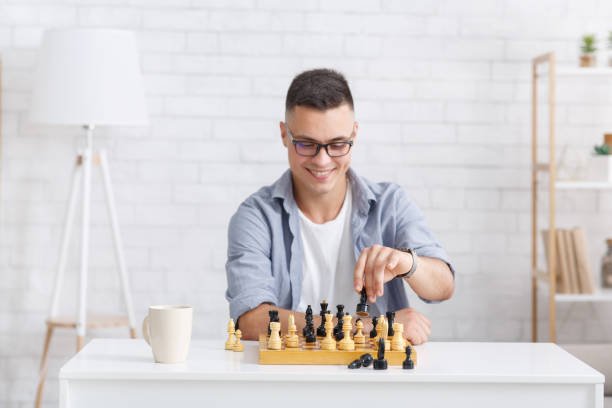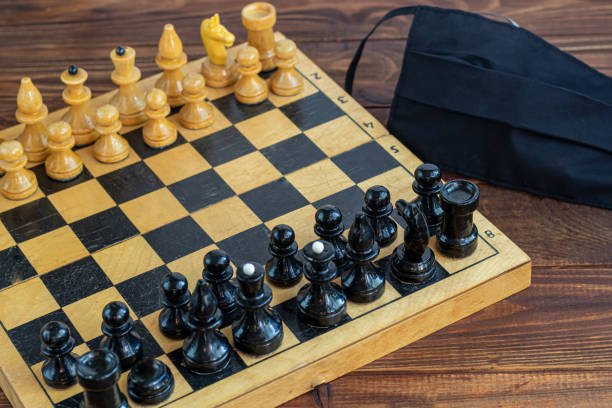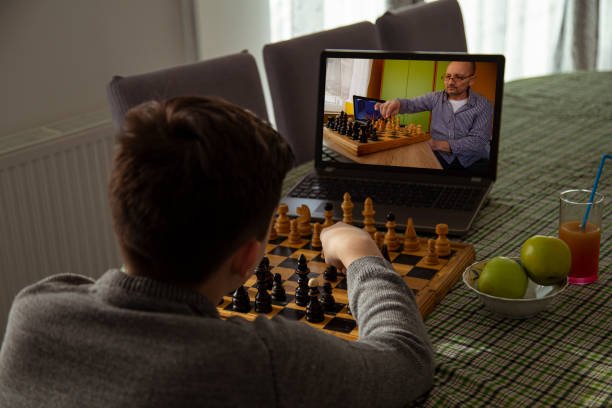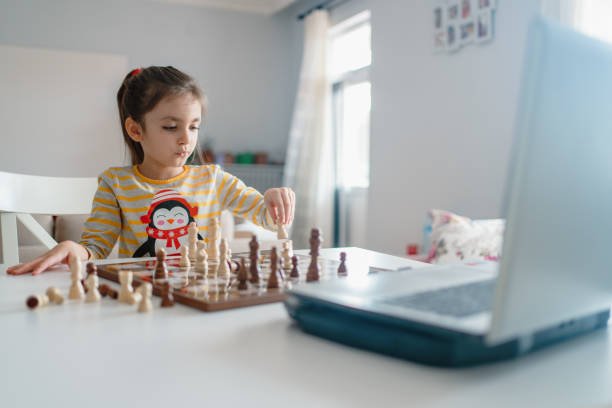Lowry Hill is one of those neighborhoods in Minneapolis where charm meets character. The streets are lined with historic homes, there’s a calm, friendly atmosphere, and families here truly care about giving their children the best opportunities to grow. Education is important, but so is helping kids develop the life skills that will guide them well beyond school.
Chess is one of those rare activities that does exactly that. It’s more than just moving pieces around a board — it’s learning how to think ahead, stay patient, and solve problems under pressure. A good chess player isn’t just reacting; they’re planning, analyzing, and adapting. Those are the same skills that help children succeed in school, sports, and everyday life.
But here’s the thing: not all chess coaching is the same. Some programs are casual and fun but unstructured, leaving students stuck at a basic level. Others follow a clear path that builds skill step-by-step, ensuring real progress over time. For parents in Lowry Hill who want more than just a hobby for their children, finding the right program is essential.
In this article, we’ll explore the chess learning options available in Lowry Hill, explain why online chess training has become the smartest choice for modern families, and show why Debsie is the clear leader — not just in Minneapolis, but around the world.
Online Chess Training
For years, learning chess meant sitting face-to-face with a coach or joining a club at a school or community center. That’s still valuable, but now there’s an approach that’s faster, more flexible, and, when done right, even more effective — online chess training.
Online chess training isn’t just clicking around a website or playing random games against strangers. True online chess coaching is a structured learning experience. It combines live lessons with a clear curriculum, game analysis, and regular practice — all tailored to the student’s level and goals. Every session has a purpose, and every concept builds on the last.

For families in Lowry Hill, this is a game-changer. Instead of rushing through traffic or adjusting your whole schedule to make a class, your child can log in from the comfort of home. A busy week at school? No problem. The flexibility of online learning means missed lessons can be rescheduled or even watched later as a recording.
Landscape of Chess Training in Lowry Hill, Minneapolis, and Why Online Chess Training is the Right Choice
In Lowry Hill and the greater Minneapolis area, chess learning happens in a few main ways — school clubs, local community programs, and private coaching. These options can be great for introducing children to the game, but they often share a weakness: they lack a clear, step-by-step system for long-term improvement.
Without a structured curriculum, young players often repeat the same mistakes for months or even years. They may enjoy playing but never develop the deeper understanding needed to advance beyond beginner or intermediate levels.
Online chess training solves this by following a planned path from the very basics to advanced strategies. Lessons are personalized, progress is tracked, and students are challenged with new skills exactly when they’re ready for them.
Another huge advantage is exposure to a global player pool. In offline clubs, your child might face the same small group of opponents repeatedly. Online training lets them test their skills against players from around the world, learning to adapt to different playing styles — a critical skill for tournament success.
How Debsie is The Best Choice When It Comes to Chess Training in Lowry Hill
This is where Debsie stands far above every other option. Debsie is not just an online chess program — it’s a complete learning system built by FIDE-certified coaches who know how to teach both the game and the thinking skills behind it.
Every student at Debsie follows a structured curriculum designed to build a rock-solid foundation before moving into advanced concepts. There’s no rushing through or skipping steps — students master each skill before moving on. This approach ensures they never hit the frustrating “plateau” that so many players experience.
Debsie also runs bi-weekly online tournaments that are fully integrated into the learning process. These tournaments give students regular chances to apply what they’ve learned in real competition, followed by immediate review and feedback from their coach.

Parents love that Debsie goes beyond teaching chess moves. Lessons are designed to build focus, patience, problem-solving, and confidence — skills that carry over into school, sports, and life in general.
For families in Lowry Hill who want a program that combines world-class coaching, a proven curriculum, and the flexibility of online learning, Debsie is clearly the best choice.
Offline Chess Training
Offline chess training — the traditional, face-to-face style — still has its strengths. There’s something special about sitting across from your opponent, physically moving the pieces, and feeling the pressure of the clock ticking down. For many children, especially beginners, the social atmosphere of an in-person club can be exciting and motivating.
In Lowry Hill, offline chess often takes place in school chess clubs, local libraries, or community programs. These can be wonderful for introducing kids to the game in a fun and friendly way. They help students meet peers who share their interest, and the casual environment can make learning feel less intimidating.
However, in most offline settings, the focus is often on playing games rather than following a clear, step-by-step curriculum. Without structured lessons, many players simply develop habits — some good, some bad — without understanding the deeper “why” behind their moves.
The other challenge with offline chess is logistical. Parents have to coordinate schedules, arrange transportation, and work around weather, traffic, or school conflicts. And if a child misses a lesson, it’s usually gone for good — there’s no replay or makeup option.
Making Offline Training More Strategic for Growth
Many offline chess programs focus heavily on casual play and light instruction. While this makes sessions enjoyable, it often slows measurable progress — which is exactly what parents look for when deciding whether to continue enrollment. Businesses that want to stay competitive should consider introducing structured skill progression systems even in offline environments.
This means mapping out a curriculum where students pass through stages — from learning the basics to mastering advanced tactics and endgames — and tracking this progress in a way that can be shown to parents. A visible improvement path not only motivates students but also reassures parents they are getting value.
Integrating Competitive Development in Offline Settings
Offline programs often rely on occasional tournaments, but for real growth, competition should be more frequent and closely linked to coaching. After each in-person match, coaches can host quick review sessions, pointing out the student’s strengths and mistakes while the game is still fresh in their mind.
Adding tiered internal leagues can also keep students engaged. For example, players could move up or down divisions based on performance, creating a healthy, motivating challenge that pushes them forward.
Blending Offline Strengths with Online Efficiency
Offline chess training doesn’t have to compete with online training — the two can work together. For businesses, this hybrid model can be a major advantage. Offline lessons can focus on personal mentorship, sportsmanship, and practical over-the-board skills, while online tools can handle game analysis, practice exercises, and global competition.
This approach allows a chess academy to keep its community feel while also expanding beyond geographical limits. It also makes the program more “future-proof,” appealing to modern families who want flexibility without sacrificing quality.

Drawbacks of Offline Chess Training
While in-person chess has its charm, it also comes with real limitations that can slow a child’s growth as a player.
One major issue is inconsistent skill development. Because many offline programs lack a fixed curriculum, students may learn pieces of strategy here and there but never build a complete understanding. This makes it hard for them to advance beyond a certain level.
Another drawback is limited opponent variety. In a small club or local group, children tend to play the same people again and again. While this is fun socially, it doesn’t prepare them for the unpredictability of tournament play, where every opponent has a different style.
Offline training is also tied to rigid schedules. If a child is sick, away for a family trip, or has a school activity at the same time, they simply miss out — and progress slows.
For chess businesses, these limitations also mean a smaller reach. Without an online component, the number of students is limited by geography, space, and time slots. This makes it harder to scale and compete with modern programs that can serve students worldwide.
All of this explains why more and more Lowry Hill families are turning to structured online training with programs like Debsie. Online chess removes these barriers, making it easier to learn, practice, and improve — no matter where you are.
Best Chess Academies in Lowry Hill, Minneapolis, Minnesota
Lowry Hill is a neighborhood that values quality — in education, in community programs, and in personal growth opportunities for kids. Chess fits perfectly into that culture. It’s both a fun activity and a serious mental workout, developing skills that last a lifetime.
While there are several ways to learn chess in and around Minneapolis, they vary in quality, structure, and long-term impact. Some are casual meetups meant mainly for social play, while others aim to train competitive players. But when you look closely, one academy stands far above the rest.
1. Debsie
Debsie is the gold standard for online chess coaching — not just in Minneapolis, but for students across the globe. Everything about the Debsie system is designed for one purpose: to help students improve as quickly and effectively as possible while also building important life skills.
At the core of Debsie’s success is its team of FIDE-certified coaches. These are world-class players who also know how to teach. They can explain complex concepts in simple, memorable ways, making lessons engaging for children and effective for long-term learning.
Debsie’s structured curriculum ensures there are no gaps in a student’s knowledge. Beginners start by learning fundamental moves and tactics, while more advanced players dive into deeper strategies, opening preparation, and endgame mastery. Students progress only when they’ve truly mastered each stage, avoiding the frustration of moving ahead too soon.
Another standout feature is Debsie’s bi-weekly online tournaments. These aren’t just for fun — they are built directly into the learning plan. Students play, then review their games with their coaches immediately afterward, turning each match into a lesson in improvement.
Parents in Lowry Hill love that Debsie teaches more than chess. Children learn focus, patience, discipline, and problem-solving — skills that help them in school, sports, and everyday challenges. And because it’s online, families get world-class coaching without ever leaving home.
2. Minnesota Chess Club
This Minneapolis-based club is known for hosting over-the-board events and meetups. It’s a great place for casual play and community interaction, but it lacks the structured, progressive curriculum that Debsie offers.
3. Chess Castle of Minnesota
Located in the Twin Cities, this is a hub for tournament players. It provides opportunities for serious competitive play, but its coaching is limited compared to Debsie’s comprehensive online training model.
4. Youth Enrichment League (YEL) Chess Program
YEL offers after-school chess programs in Minneapolis and other cities. These are excellent for introducing kids to chess in a friendly setting, but they don’t provide the same long-term development path or personal coaching that Debsie does.
5. Twin Cities Chess Club
This local club gives players a space to meet and play. While it’s great for building a chess community, it doesn’t match the level of personalized instruction and structured advancement found in Debsie’s program.
Why Online Chess Training is The Future
The way we learn is changing. Just as schools and workplaces now blend in-person and remote options, chess training is moving toward a model that’s more flexible, more connected, and more effective.
For Lowry Hill families, online chess training means access without limits. You’re no longer restricted to the handful of local coaches nearby. Your child can learn from world-class trainers, compete against players worldwide, and do it all from the safety and comfort of home.

It also means flexibility. If your week is busy, lessons can be rescheduled or recorded for later viewing. There’s no lost progress because of illness, travel, or weather.
Most importantly, online chess training integrates technology-driven improvement. Tools like game analysis engines, progress tracking, and targeted exercises make learning faster and more precise. Parents can see exactly how their child is improving over time — something that’s much harder to measure in casual offline play.
As tournaments, coaching, and global competition continue moving online, players who train in this environment will naturally have an edge.
A Global Talent Pool Without Boundaries
For learners, online chess training removes the geographical limits that offline programs face. A student in Lowry Hill can train with a grandmaster living halfway across the world without either party needing to travel. This access to top-tier coaching levels the playing field, allowing small neighborhoods to compete with major chess hubs.
For businesses, this means the potential market is no longer capped by the local population. With the right platform, a chess academy can teach students across time zones, creating new revenue streams without expanding physical space. This scalability is why more forward-thinking academies are building online divisions even if they already have strong local attendance.
Data-Driven Improvement
In an online environment, every move, game, and mistake can be recorded and analyzed instantly. Students can see exactly where they went wrong and revisit those moments in a way that is far more precise than simply recalling a match from memory.
For businesses, this data is gold. It can be used to create progress reports for parents, personalize training plans for students, and even identify trends in player weaknesses across the academy. Over time, this builds a reputation for results, which is the most powerful form of marketing.
Flexible Engagement for Retention
One of the biggest challenges for offline academies is student retention. Life gets in the way — vacations, school events, sports practice, or bad weather — and students miss sessions. In online training, flexibility is built-in. Lessons can be attended live or recorded, ensuring students never fall behind.
From a business perspective, this reduces churn. When students can maintain consistent attendance regardless of their schedule, they are far more likely to remain enrolled long-term.
Faster Skill Development Through Hybrid Models
Online training doesn’t mean losing the benefits of face-to-face learning. In fact, the most successful academies are moving toward hybrid models — combining online lessons for structure, analysis, and global play with occasional in-person meetups for tournaments and community bonding.
Businesses that adopt this approach get the best of both worlds: the scalability and flexibility of online with the personal connection of offline. And for students, the variety keeps learning exciting and prevents the burnout that can happen when training feels repetitive.
How Debsie Leads the Online Chess Training Landscape
If online chess training is the future, Debsie is already living in that future — and setting the standard for everyone else.
Debsie isn’t just a place to take lessons. It’s a complete system that turns any motivated student into a strategic, confident, and competitive chess player. Every child starts with a personalized improvement plan designed around their current skills and goals.
Its FIDE-certified coaches don’t just teach openings and tactics — they teach how to think. They use real games, guided practice, and targeted feedback to build skills layer by layer, so improvement is steady and permanent.
The bi-weekly tournaments keep students sharp, giving them regular competition and immediate post-game analysis. This constant feedback loop ensures progress never stalls.
And beyond the game, Debsie focuses on building life skills — concentration, patience, resilience, and strategic decision-making — so the benefits go far beyond the chessboard.
For parents in Lowry Hill who want the absolute best in chess education, Debsie delivers unmatched results. It combines the structure of a school, the personalization of private coaching, and the excitement of real competition — all in one flexible, online package.

Conclusion
Lowry Hill is a neighborhood that values excellence. Families here want more than activities to fill time — they want opportunities that shape young minds, build character, and inspire lifelong skills. Chess is one of those rare pursuits that does all of this at once.
While traditional offline programs in Minneapolis can offer a friendly introduction to the game, they often lack the structure, variety, and flexibility needed for true, long-term improvement. Online chess training changes that — and Debsie is the clear leader in this space.
With FIDE-certified coaches, a step-by-step curriculum, bi-weekly tournaments, and a focus on building both chess mastery and life skills, Debsie offers an unmatched learning experience. It’s flexible enough to fit any schedule and strong enough to produce real, measurable results.
If you want your child to grow into a confident, strategic thinker — both on and off the board — now is the time to take the next step.
Book a free trial class with Debsie today, and watch your child start making smarter moves in chess and in life.



